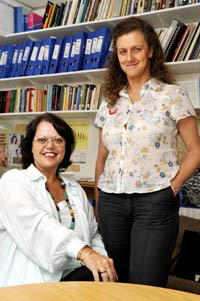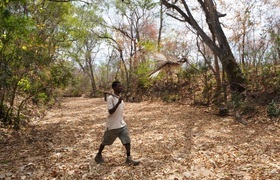Educational practice award for Grant and Kalil
23 January 2009 | Story by Newsroom Terri Grant and Claudia Kalil, have won a CHED award for their innovative collaborative teaching material.
Terri Grant and Claudia Kalil, have won a CHED award for their innovative collaborative teaching material.
Terri Grant and Claudia Kalil of the Professional Communication Unit have won a prestigious R40 000 CHED award for their innovative collaborative educational practice.
This award recognises outstanding collaborative approaches by UCT staff, which enhance the teaching and learning environment.
The team won the award for two courses: a computer science course using scenarios based on the ISIS and SupaTsela Projects at UCT, and a commerce course that examined a recent sustainability project at UCT.
"Richard van Huyssteen, who was in charge of the ISIS project (the introduction of the Peoplesoft student system) was our 'expert' advisor for our PCU computer science course and acted as chief liaison for the student investigative teams," Grant said.
They used John Critien, director of Properties & Services, as their 'expert' source for the recent sustainability policy launch and Go Green campaign at UCT for accounting conversion and management studies students.
"Both Richard and John put the students in touch with other specialists who provided help with particular focus areas."
As these are real projects, students got first-hand information and experience in investigating real-time problems and issues. They then presented their findings in article or report format and in an oral presentation, attended by external experts.
"The students appreciated the authenticity of this collaborative learning experience," Grant said. "All the professional communication marks were based on their in-class activities, planning exercises and their final products."
Professor Daya Reddy, chair of the award committee, said: "The project, Scenario Learning: Embedding teaching and learning within a professional framework, was found to be an excellent example of collaborative educational practice - in particular, the use of authentic problems for students to work on. The collaboration between academic and PASS departments is also to be commended."
Students have also praised the scenario learning courses. One wrote: "It's easier to relate to the subject when using real events, rather than just using a textbook", and another said: "Learning to conduct proper research and investigation and putting it down in an article has been quite a challenging but an educational advancement to me and my project team."
The innovative scenario learning approach has also attracted international attention and Grant and Kalil have been invited to present the concept at a UK conference in 2010.
 This work is licensed under a Creative Commons Attribution-NoDerivatives 4.0 International License.
This work is licensed under a Creative Commons Attribution-NoDerivatives 4.0 International License.
Please view the republishing articles page for more information.










